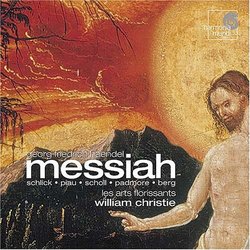| All Artists: George Frideric Handel, William Christie, Les Arts Florissants, Barbara Schlick, Sandrine Piau, Andreas Scholl, Mark Padmore, Nathan Berg, Tommy Williams, Hiro Kurosaki Title: Handel - Messiah Members Wishing: 0 Total Copies: 0 Label: Harmonia Mundi Fr. Original Release Date: 1/1/2006 Re-Release Date: 1/10/2006 Album Type: Import, Original recording reissued, Deluxe Edition Genre: Classical Styles: Opera & Classical Vocal, Historical Periods, Baroque (c.1600-1750) Number of Discs: 2 SwapaCD Credits: 2 UPC: 794881786022 |
Search - George Frideric Handel, William Christie, Les Arts Florissants :: Handel - Messiah
 | George Frideric Handel, William Christie, Les Arts Florissants Handel - Messiah Genre: Classical
|
Larger Image |
CD Details |
CD ReviewsA voice teacher and early music fan George Peabody | Planet Earth | 07/27/2009 (4 out of 5 stars) "DISAPPOINTING CHORAL RENDITIONS, BUT EXCELLENT PERIOD ORCHESTRA AND SOLOISTS.
When one evaluates this wonderfully inspirational music of George Fredric Handel(1685-1759) one must remember that the evaluation is not for the MUSIC but for the PERFORMANCE of the music. I feel I am being generous by awarding this rendition of Christie's with four stars! It fails to excite me - not bad, but just does not stand out except for the orchestra and the soloists, who do a fine job throughout. It pales in contrast to other recordings by Budday (Maulbronn), Gardiner, Hogwood, Higginbottom and Pinnock. However, the Period Orchestra is warm-sounding and precise, somewhat light, displaying the archictecture of the music splendidly. They play skillfully and attempt to fit themselves to the choral singing. Mark Padmore, tenor par excellence, performs his arias with skill, particularly his first aria: "Comfort Ye, My People", in which he projects a tender, yet commanding voice. He delivers his 'laugh him to scorn' with fierce pleasure, and later on in the tenor arioso', 'thou shalt break them with a rod of steel', he presents vocally a vivid depiction of violent action. One must keep in mind, always, that this was written as theater music, and indeed in Handel's lifetime was only performed once in a sacred place. So Padmore lets loose with all the drama one could ask for; this is not Bach in any sense of the word. Nathan Berg's bass is thin, but has clarity and he does a creditable job of musical story-telling in the lines 'but the Lord shall rise upon thee'. I'm not so convinced in his aria 'The Trumpet Shall sound' though rendered neatly and correctly, his voice is almost too light for this aria. Andreas Scholl, countertenor par excellence, along with Padmore are, in my humble opinion(honest!), the 'stars' on this recording. Scholl, sings with much drama and skill, the VERY DIFFICULT aria "He is like a Refiner's Fire", which requires not only speed, but the voice is required to go suddenly from extreme highs to extreme lows, and he does it all with perfection. The soprano Sandrine Piau uses much ornamentation and executes her runs and trills faultlessly. She is constantly springing surprises on the listener. Example: In her 'Rejoice Greatly', the da capo section, she adds tiny grace notes and trills at the end of the word 'Rejoice' - she shows much spontaniety in her deliveries. Barbara Schlick, a well-known Baroque soprano, sings with a voice that is generally heavier than the light British soprano voice (Emma Kirkby), but not excessively so. Her vibrato is adequately placed where appropriate, and overall, this adds up to a voice that might be called from the best of two worlds. In the aria "I Know that my Redeemer liveth", she sings gently, but with a secure and ringing sound. As to the performance of the Chorus, this is where it goes 'downhill'. All of these truly wonderfully composed Handel choruses were totally engulfed and overwhelmed by the HEAVY sound of the sopranos whose pitch was questionable and many times difficult to 'call' because the vibrato covered up any clarity that might have come through from the lower voices. The balance was poor and the whole thing lacked buoyancy and emotional power. How disappointing to have such outstanding soloists, a good period orchestra, and have it all brought down by poor choral renditions!!! Shame on you, William Christie! " |

 Track Listings (18) - Disc #1
Track Listings (18) - Disc #1